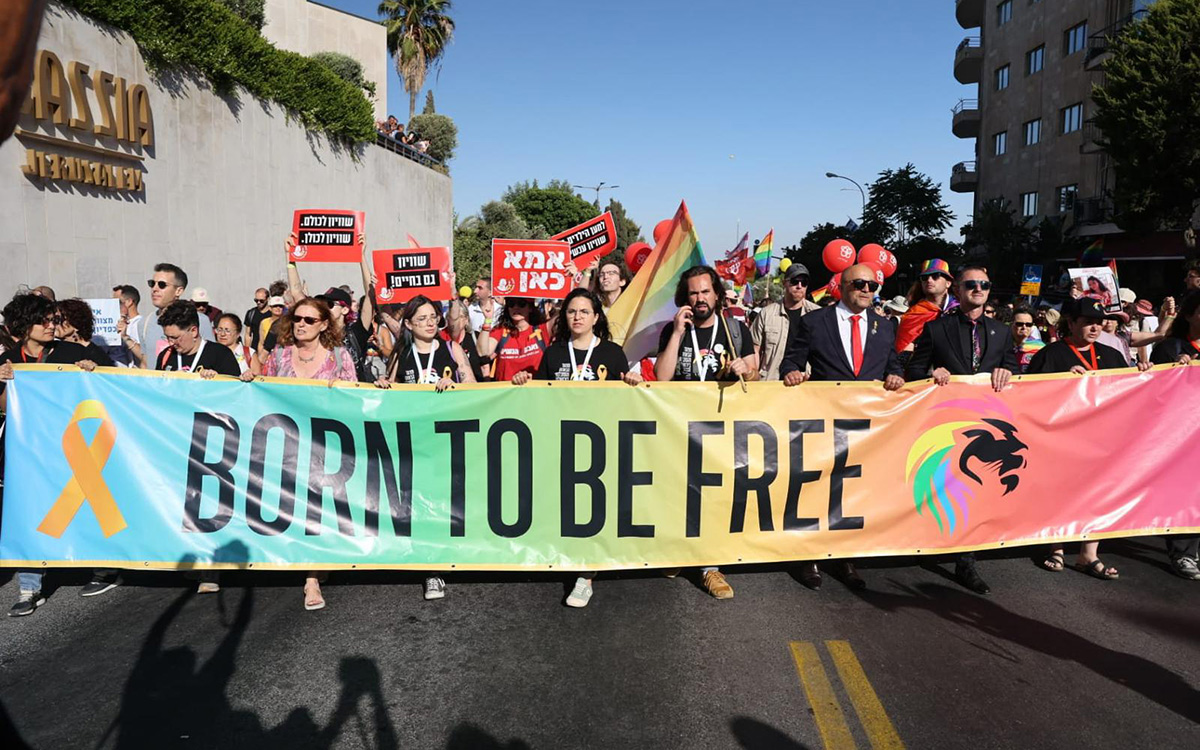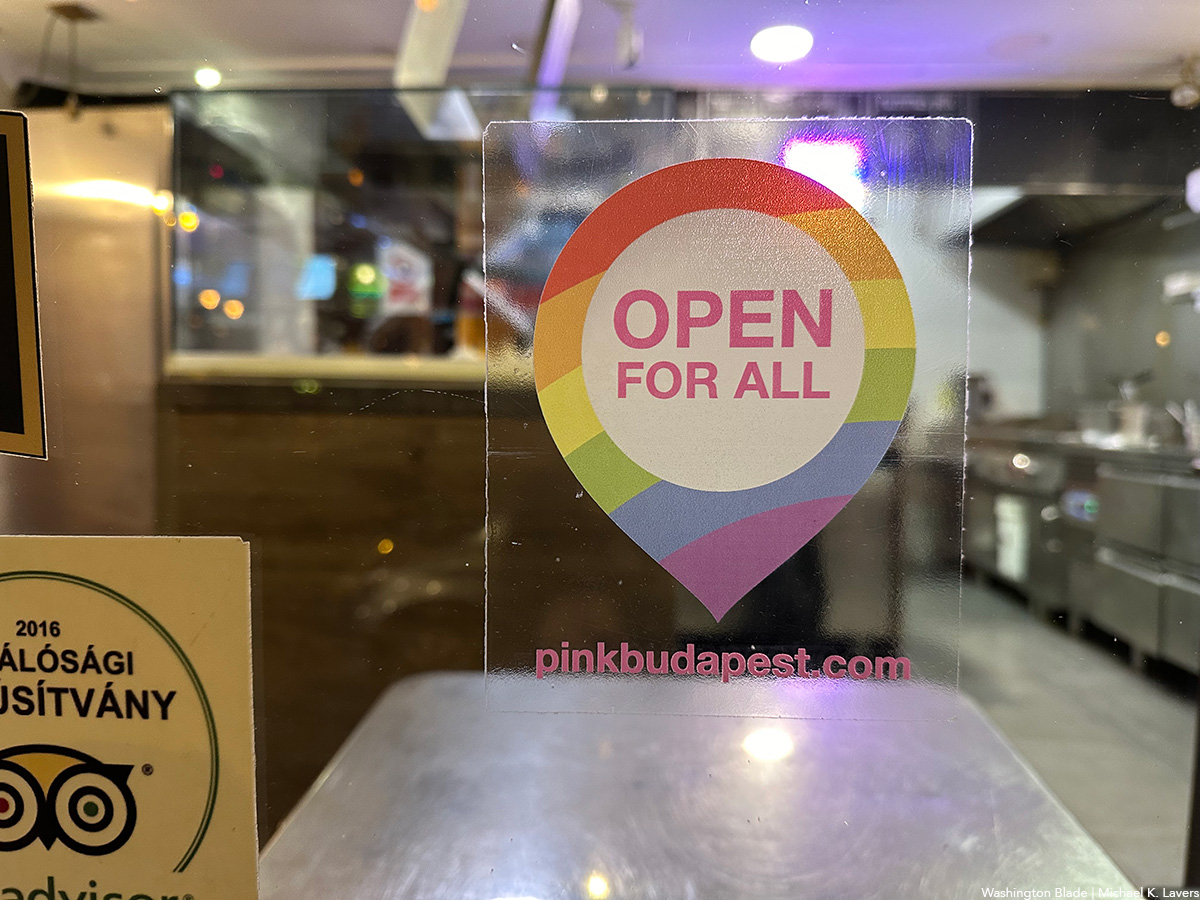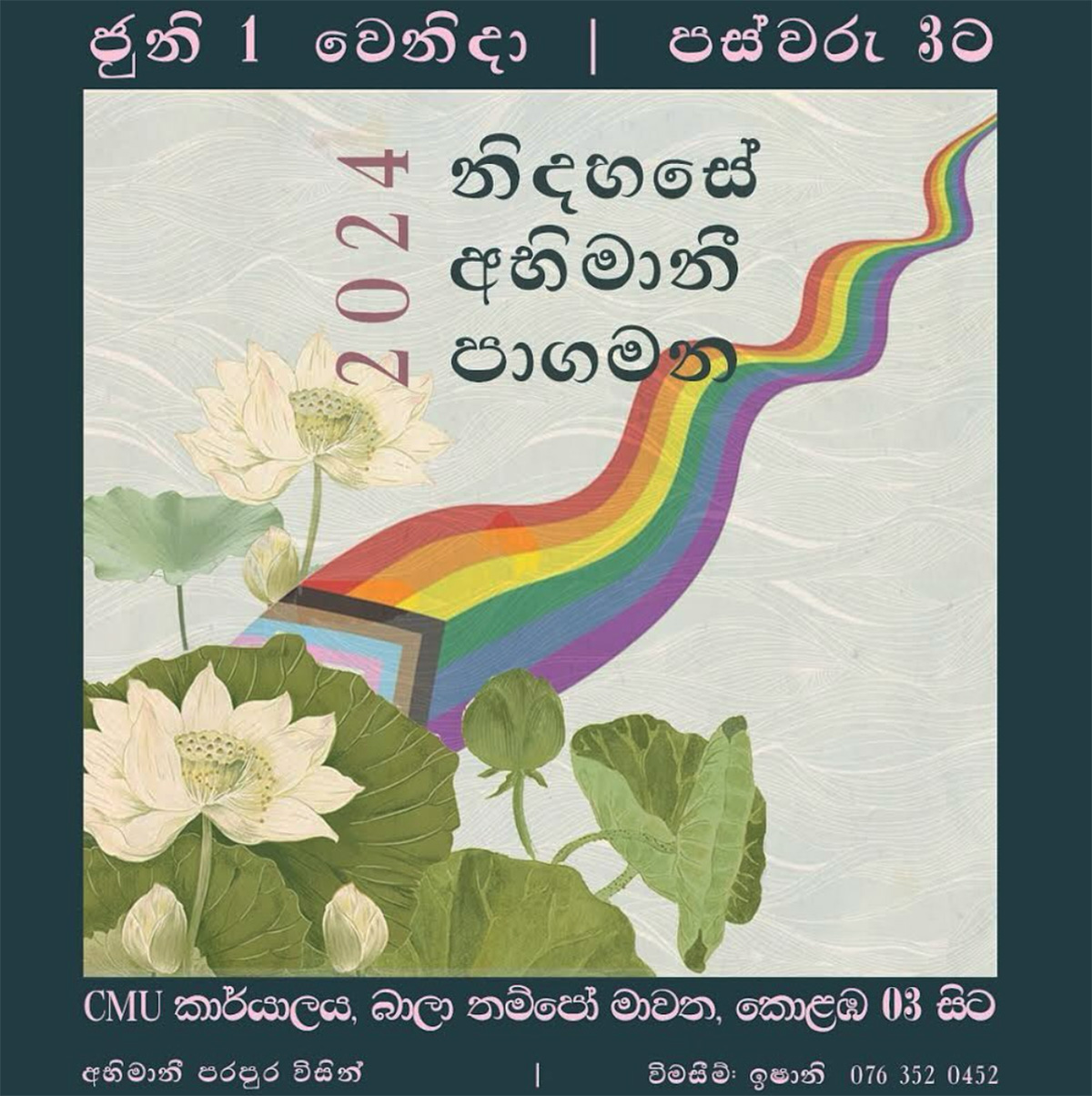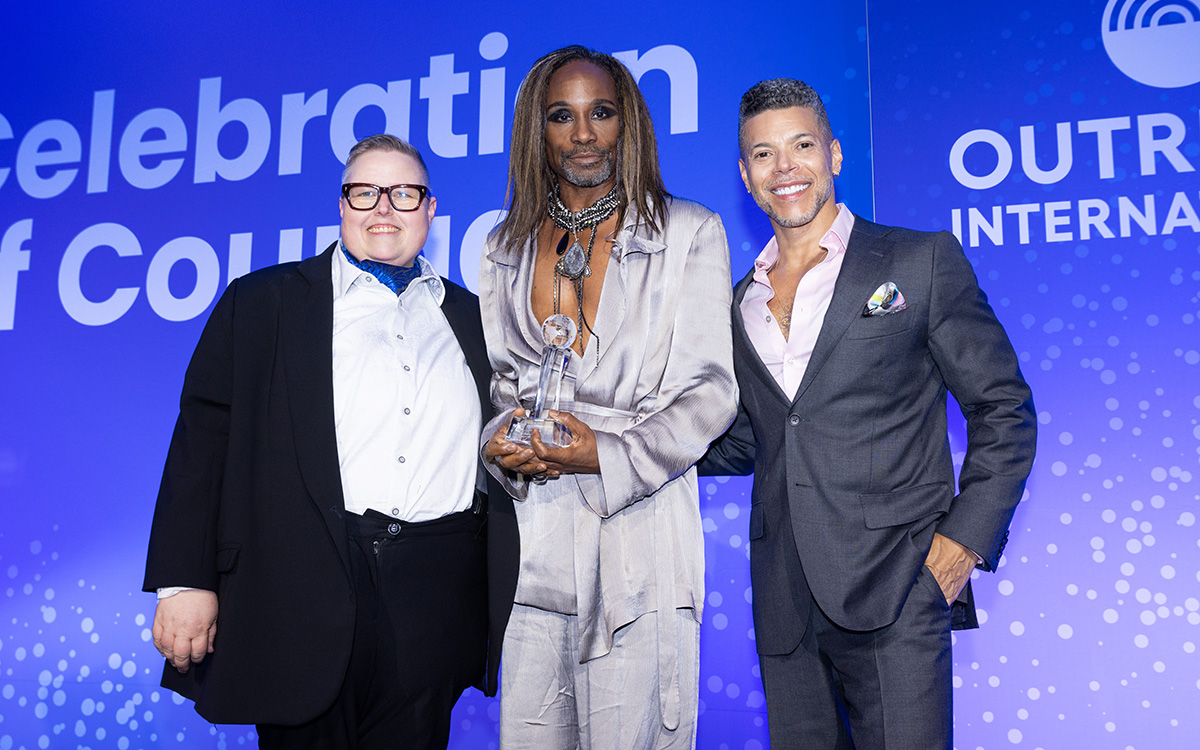World
Anti-LGBTQ crackdowns, war loom over Pride Month events
Annual Jerusalem Pride parade took place on May 30

Activists around the world are marking Pride Month against the backdrop of continued legislative attacks against LGBTQ people and war.
The annual Budapest Pride march will take place in the Hungarian capital on June 22.
Hungarian celebrities, artists and human rights activists are expected to speak at the opening of the Budapest Pride Community Festival on Friday. The event, which will end on June 23, will feature documentary screenings, panel discussions, sporting events and other gatherings.
Gay U.S. Ambassador to Hungary David Pressman during a speech he gave at a Budapest Pride reception last year criticized the ongoing crackdown against LGBTQ and intersex rights that Prime Minister Viktor Orbán’s government has carried out.
“Pride is a particularly important event in Hungary,” Budapest Pride spokesperson Johanna Majercsik told the Washington Blade in an email. “Despite being a full member of the European Union since 2004, the Hungarian government has systematically reduced the rights of the LGBTQ+ community, and the government apparently doesn’t want to stop there, inciting people against our community, and making references about passing new anti-LGBTQ laws in the future (calling them child protection laws).”

More than 150,000 people participated in the annual Seoul Queer Culture Festival in the South Korean capital on June 1, even though authorities had denied permits to organizers.
Bangga di Bali or “Pride in Bali” will take place on the Indonesian island on June 15.
Safety concerns prompted organizers of ASEAN Queer Advocacy Week, which was to have taken place last July in Jakarta, the Indonesian capital, to cancel it. Bangga di Bali on its Instagram page says the event seeks “to strengthen and boost individual and collective confidence, as well as increase solidarity between the gender diverse community and its allies in Bali.”
Ugandan President Yoweri Museveni in May 2023 signed his country’s Anti-Homosexuality Act that, among other things, contains a death penalty provision for “aggravated homosexuality.”
The Ugandan Constitutional Court last month refused to “nullify the Anti-Homosexuality Act in its totality.” A group of Ugandan LGBTQ activists have appealed the ruling.
Shemerirwe Agnes, executive director of the Uganda-based Africa Queer Network, told the Blade there are no plans to hold a national Pride event because of “significant security concerns” over the Anti-Homosexuality Act.
“This law has created a highly hostile environment for LGBTQIA+ individuals, making public gatherings and celebrations risky,” said Agnes. “Any form of public Pride event would likely attract unwanted attention and potential violence from both the authorities and the public.”
Yaga Piuson, an activist in East Africa, said LGBTQ people who live in the Kakuma refugee camp in Kenya and the Gorom Refugee Settlement in South Sudan plan to organize Pride events. Piuson said there will not be any Pride events outside the camps in the two countries
“It’s too bad and deadly to organize it outside the camps,” said Piuson.
Lawmakers in Kenya, South Sudan, Tanzania and other African countries have introduced bills that are similar to Uganda’s Anti-Homosexuality Act. LGBTQ Voice Tanzania nevertheless plans to hold a Pride event on June 29 in Dar es Salaam, the country’s largest city and commercial capital.
“Although security concerns exist, we refuse to be silenced by oppressive laws,” LGBT Voice Tanzania’s Salumu Hatibu. “We are fully prepared for any challenges that may arise.”
Kyiv Pride will on June 16 under the moniker “let’s unite for the sake of equality and victory.” It is the first time the event will take place in the Ukrainian capital since Russia launched its war in 2022.
Upwards of 10,000 people participated in the annual Jerusalem Pride and Tolerance Parade on May 30.
Tel Aviv Mayor Ron Huldai, with the support of LGBTQ activists, last month cancelled the city’s annual Pride parade that would have taken place roughly seven months after Hamas launched its surprise attack against southern Israel.
Jerusalem Pride participants called for the release of the hostages who remain in the Gaza Strip. Omer Ohana, whose fiancé, Maj. Sagi Golan, died while fighting Hamas militants in Kibbutz Be’eri in southern Israel on Oct. 7, 2023, is among those who spoke.
“Out of the despair and pain, a central thing became clear — the cure for pain, sadness and loss — is the community,” said Nilly Maderer, CEO of Jerusalem Open House for Pride and Tolerance, which organizes the Pride parade.
Amnesty International and Human Dignity Trust both note Gaza is among the jurisdictions around the world in which consensual same-sex sexual relations remain criminalized.
The Namibian Supreme Court on June 16 is expected to issue a ruling that could repeal the country’s sodomy law. Wendelinus Hamutenya-Jeremiah, executive prime director of Gender Diversity Movement Trust noted to the Blade the country’s first Pride City Tour/Parade will take place in cities across Namibia this month.
Saint Lucia Pride is scheduled to take place from Aug. 30-Sept. 2, even though it is among the English-speaking Caribbean nations in which homosexuality remains illegal. Generation Pride took place last weekend in Sri Lanka, a former British colony with a sodomy law of which the country’s government supports the repeal.

Thai Prime Minister Srettha Thavisin is among those who participated in the annual Bangkok Pride Parade on June 1. A bill that would extend marriage rights to same-sex couples is expected to receive final approval in the country’s parliament later this month.
Outright International on June 1 honored Mitini Nepal, a Nepalese LGBTQ and intersex rights group, actor Billy Porter and the Adobe Foundation at their annual Celebration of Courage gala in New York. The event raised more than $900,000 for the organization.
“We’re all here because we believe in confronting formidable challenges,” said Outright International Executive Director Maria Sjödin. “Sometimes it feels daunting, but you show how much passionate support there is and how we can and how we will fight as long as we need to together.”

George Avni and Daniel Itai contributed to this article.
District of Columbia
Activists protest outside Hungarian Embassy in DC
Budapest Pride scheduled to take place Saturday, despite ban

More than two dozen activists gathered in front of the Hungarian Embassy in D.C. on Friday to protest the country’s ban on Budapest Pride and other LGBTQ-specific events.
Amnesty International USA Executive Director Paul O’Brien read a letter that Dávid Vig, executive director of Amnesty International Hungary, wrote.
“For 30 years Budapest Pride has been a celebration of hope, courage, and love,” said Vig in the letter that O’Brien read. “Each march through the streets of Budapest has been a powerful testament to the resilience of those who dare to demand equality, but a new law threatens to erase Pride and silence everyone who demands equal rights for LGBTI people.”
“The Hungarian government’s relentless campaign against LGBTI rights represents a worrying trend that can spread normalizing division and hatred,” added Vig. “Thank you for standing with us when we refuse to be intimidated.”
Council for Global Equality Chair Mark Bromley and two of his colleagues — Stephen Leonelli and Keifer Buckingham — also spoke. Health GAP Executive Director Asia Russell and Chloe Schwenke, a political appointee in the Obama-Biden administration who worked for the U.S. Agency for International Development, and Planned Parenthood staffers are among those who attended the protest.
(Washington Blade video by Michael K. Lavers)
Hungarian lawmakers in March passed a bill that bans Pride events and allow authorities to use facial recognition technology to identify those who participate in them. MPs in April amended the Hungarian constitution to ban public LGBTQ events.
Budapest Pride is scheduled to take place on Saturday, despite the ban. Hundreds of European lawmakers are expected to participate.
“Sending strength to the patriotic Hungarians marching tomorrow to advance human dignity and fundamental rights in a country they love,” said David Pressman, the gay former U.S. Ambassador to Hungary, on Friday on social media.
Sending strength to the patriotic Hungarians marching tomorrow to advance human dignity and fundamental rights in a country they love. Szabadság és szerelem. My past remarks on Budapest Pride: https://t.co/y1QhA9QouA
— David Pressman (@AmbPressman) June 27, 2025
India
Indian court rules a transgender woman is a woman
Activists across the country celebrated landmark decision

The Andhra Pradesh High Court on June 16 issued a landmark ruling that says Indian law cannot deny transgender women recognition as women solely because they cannot bear children.
Justice Venkata Jyothirmai Pratapa, who presided over the case, rejected arguments that tie womanhood exclusively to reproductive capacity, declaring such views “legally unsustainable” and contrary to the Indian constitution’s guarantees of dignity, equality, and identity. The decision, rooted in the Supreme Court’s 2014 National Legal Services Authority v. Union of India ruling that recognized individuals as a “third gender” with equal fundamental rights, marks a significant step toward gender justice in India.
“A trans woman, born male and later transitioning to female, is legally entitled to recognition as a woman,” Pratapa declared.
The court emphasized this recognition is enshrined in Articles 14, 15, and 21 of the constitution; which guarantee equality before the law, prohibit discrimination based on sex, and protect the right to life and personal liberty respectively. Pratapa further clarified that trans women are entitled to the same protections as cisgender women under Section 498A of the Indian penal code, which addresses cruelty by a husband or his relatives.
“Denying such protection by questioning their womanhood amounts to discrimination,” said the High Court in its ruling.
The ruling came in response to a petition filed by Viswanathan Krishnamurthy and his parents, who sought to dismiss a dowry harassment case brought by Pokala Sabhana, a trans woman. Shabana alleged that Krishnamurthy and his family subjected her to cruelty and demanded dowry, charges that prompted her to seek protection under Section 498A.
The court’s decision to uphold her legal standing as a woman ensures that trans women can access critical protections against domestic abuse, setting a precedent for future cases.
Section 498A’s applicability to trans women, as the court affirmed, extends critical protections against domestic cruelty to marginalized groups. Trans women can now seek legal recourse under this provision for physical, emotional, or economic abuse, including dowry-related harassment, by their husbands or in-laws. This recognition ensures access to police intervention, potential arrest of perpetrators, and penalties under the Indian penal code, aligning trans women’s marital protections with those afforded to cisgender women. By including trans women under Section 498A, the ruling strengthens their ability to combat domestic violence and assert their rights within familial structures.
Shabana and Krishnamurthy lived together in Ongole, a city in Andhra Pradesh, for a short time before Krishnamurthy relocated to Chennai and ceased communication, according to the court document the Washington Blade obtained.
Shabana filed a complaint at the Ongole Women’s Police Station, alleging her in-laws threatened her life and that Krishnamurthy abused her. Based on her accusations, the police registered a case against Krishnamurthy and his parents under Section 498A.
Krishnamurthy and his parents in 2022 petitioned the Andhra Pradesh High Court to dismiss the case, arguing that Shabana, as a trans woman, could not invoke Section 498A, a provision typically applied to cisgender women.
The petitioners’ counsel argued that trans women, due to their inability to conceive, do not meet the legal definition of a woman and thus cannot invoke Section 498A. They also contended Shabana’s cruelty and dowry harassment allegations were baseless and lacked evidentiary support.
The Andhra Pradesh High Court rejected the petitioners’ arguments, ruling that gender identity does not hinge on the ability to bear children and other biological factors. The court affirmed that trans women, like Shabana, have the right to file complaints under Section 498A and are entitled to all constitutional protections afforded to women under the constitution.
While affirming that trans women are legally recognized as women, the Andhra Pradesh High Court dismissed the case against Krishnamurthy and his family, citing insufficient evidence rather than gender-based arguments.
The court noted Shabana’s claims of dowry demands and cruelty lacked supporting material. It ruled that proceeding with the trial without prima facie evidence would constitute a misuse of the judicial process.
“I am relieved, the delighted and thank the Andhra Pradesh High Court and the judge for upholding our basic human right to be identified as what we want. What better reason could that be for celebrating this Pride Month,” said Kalki Subramaniam, a prominent trans activist and artist. “For transgender community, especially trans women this verdict means a lot.”
Subramaniam told the Blade that the verdict is a momentous achievement. She described it as a significant stride toward justice, dignity, and equality for trans people throughout India.
“By affirming their legal status as women, the court has shattered discriminatory barriers and reinforced the fundamental principle that identity is valid and deserving of full legal protection,” said Subramaniam. “This ruling marks a significant moment of progress, sending a clear message that our legal frameworks are evolving to be more inclusive and reflective of the diverse realities of our society. It is a victory of human rights and a beacon of hope for a more equitable future.”
Meera Parida, a prominent trans activist in Odisha, told the Blade the ruling is a significant triumph.
“Only because a trans woman cannot bear a child, she is not a woman — that’s not good,” she said.
“This is a respectful judgement for all of us,” added Parida. “This is restoring equality and somewhere because of this verdict the stigmatization wall will fall and people will respect us. I respect this verdict.”
“This verdict is very progressive and a crucial step forward to the transgender community and gender equality,” Rani Patel, president and founder of Aarohan, an organization that works to address educational disparities among underprivileged communities and advocates for LGBTQ rights, told the Blade. “People said that we should give them separate toilets and classrooms, but that totally excludes them from the community. Many women also cannot give birth to a child, so that is totally different.”
“If someone is carrying themselves as female, they should be honored with their status,” added Patel. “Since the purpose of the verdict is to recognize trans women as women, they will get all the status and rights as cisgender women in dowry and harassment cases.”

Authorities in the Indonesian city of Bogor on June 22 arrested 75 people after they raided a “gay party.”
Amnesty International in a press release notes the party was taking place at a villa in the city’s Puncak neighborhood. A local police chief reportedly said officers raided the gathering “following reports from the public regarding ‘gay activities.'”
“The police claimed to have secured a number of pieces of evidence, among them sex toys, four condoms, and a sword used for a dance performance,” said Amnesty International.
Bogor is roughly 40 miles south of Jakarta, the Indonesian capital, on the country’s Java island.
Officers took the 74 men and one woman they arrested to police headquarters. Amnesty International says they “were subjected to further examination, including health checks, and HIV tests.”
“The Indonesian authorities must end these hate-based and humiliating raids,” said Amnesty International. “No one should be subjected to arrest, intimidation, or public shaming because of their actual or perceived sexual orientation or gender identity.”
“The police must immediately release all those arrested,” it added. “Indonesia’s government must also take urgent steps to ensure accountability for human rights violations committed by the police, and work toward creating an environment where LGBTI individuals and their allies can live free from fear and harassment.”
Amnesty International notes authorities in Jakarta on May 24 raided a “gay sex party” at a hotel and arrested nine people. Indonesian police on Feb. 1 detained 56 people in a different Jakarta hotel after they raided “a gay party.”
Jakarta authorities in 2017 arrested 51 people who were attending a “gay party” at a sauna.
“These raids have increased in frequency in the first half of the year,” an Indonesian LGBTQ activist told the Washington Blade on Wednesday.
Amnesty International in its press release notes those arrested in the raids could face up to 15 years in prison for violating Indonesia’s Pornography Law.
“The Pornography Law defines pornography broadly, encompassing material that contravenes norms of community morality,” says Amnesty International. “Ambiguously worded laws on pornography are often exploited to deliberately target LGBTI people, denying them the basic right to privacy and the right to enter into consensual relationships.”
-

 U.S. Supreme Court12 hours ago
U.S. Supreme Court12 hours agoSupreme Court upholds ACA rule that makes PrEP, other preventative care free
-

 U.S. Supreme Court13 hours ago
U.S. Supreme Court13 hours agoSupreme Court rules parents must have option to opt children out of LGBTQ-specific lessons
-

 National2 days ago
National2 days agoEvan Wolfson on the 10-year legacy of marriage equality
-

 District of Columbia3 days ago
District of Columbia3 days agoActivists fight to protect LGBTQ services in D.C. budget









